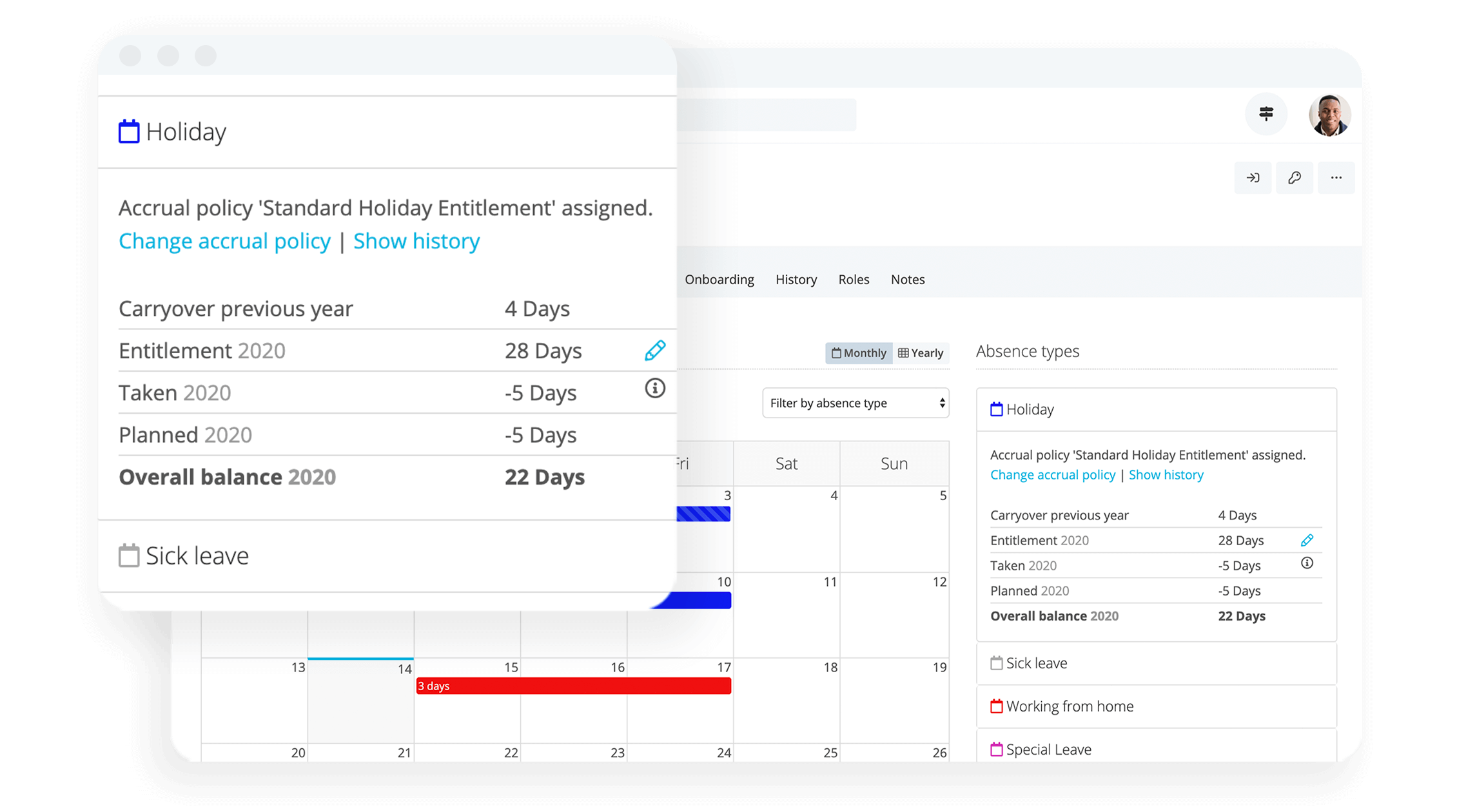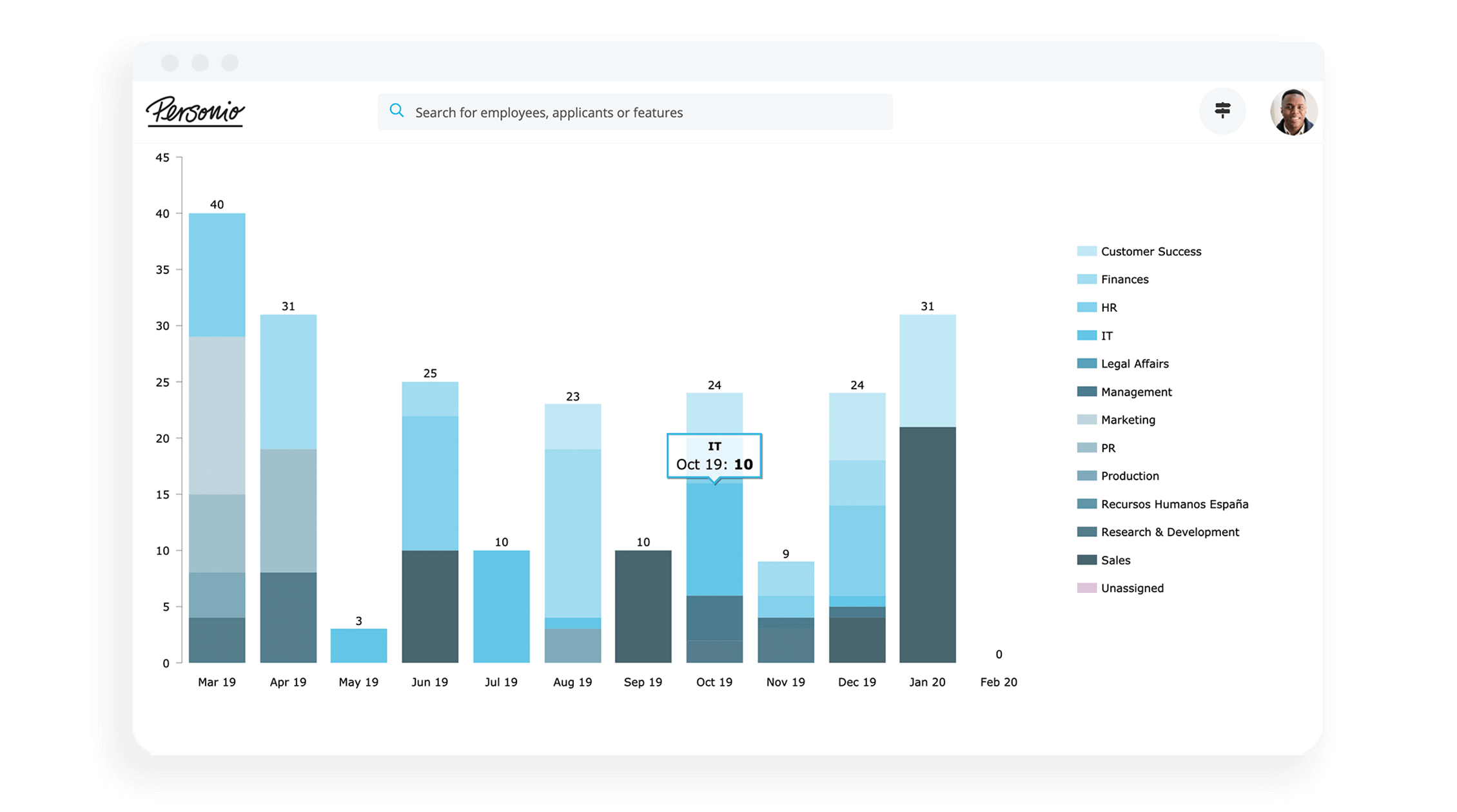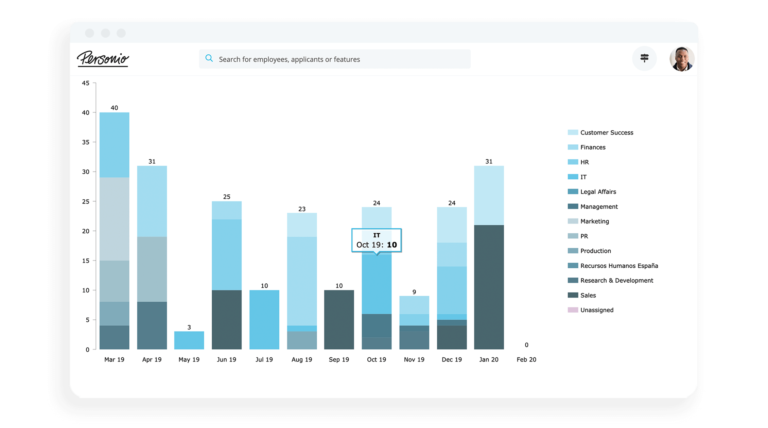
14-Day Free Trial
Track leave, illnesses and bank holidays from one place: Personio.
Book your free demoLeave of Absence: What Does It Mean for HR Managers?

What are an HR manager’s responsibilities when an employee takes a leave of absence? Whether required by law or company policy, HR has to oversee, manage and correctly implement the rules of the programme. Learn the ins and outs of employee leaves of absence and HR’s responsibilities when someone within the company requests it.
Key Facts
A leave of absence is an extended period away from work that’s often more complicated to manage than a typical holiday or sick leave.
HR representatives should handle leave requests delicately and empathetically, as they’re often requested due to stressful personal situations.
HR professionals must understand government regulations regarding specific leave requests to avoid legal action.
The Meaning of a Leave of Absence
A leave of absence (LOA) is an extended period of time an employee takes off from work while remaining employed by the company. It’s different from the more common holiday or sick leave and is more complex to manage on a case-by-case basis.
Typically, workers seek this type of leave only under extraordinary circumstances. In many cases, employees are not paid during a leave of absence, but some organisations may have a different policy.
HR’s Role When It Comes to Leaves of Absence
Overseeing LOAs is part of HR’s overall responsibilities. HR is tasked with implementing and tracking LOAs correctly, including keeping tabs on any relevant laws. They also make sure the policy isn’t abused or used unnecessarily.
Proper management of the organisation’s leaves of absence ensures that your employees’ needs are met, encouraging loyalty to the company while mitigating loss in productivity.
Most Common Reasons for a Leave of Absence
Below are a few commonplace reasons why employees ask for a leave of absence. Your company’s LOA policy handles most cases, but others are regulated by law and require specific responses that we’ve outlined below.
Maternity Leave
Maternity leave is the time off an employee receives after giving birth. By law, they must take two weeks of paid leave after the baby is born (four weeks if they work in a factory). Beyond that, they’re entitled to up to 52 weeks of paid leave.
During maternity leave, employees receive Statutory Maternity Pay (SMP), which entitles them to 90% of their average weekly earnings for the first six weeks. For the next 33 weeks, they’re entitled to £151.97 per week. This is a legal requirement in the UK. When an employee goes on maternity leave, you must confirm their SMP within 28 days of receiving the request.
In addition to SMP, birthing parents are entitled to Occupational Maternity Pay (OMP), which is an optional extra payment made to employees on maternity leave. You can require additional conditions for employees to take OMP, such as employment length pre-OMP or attaching contingencies to the OMP.
Paternity Leave
Paternity leave is a one or two-week entitlement that an employee receives when they’ve adopted a child, or their partner has given birth. An employee’s paternity leave is protected by law, which means they can return to work after paternity leave, and they can accrue holiday leave during their LOA.
The law doesn’t require parental leave to be paid, but many companies include continued compensation as part of their LOA policy. Typically, they receive 90% of their average weekly earnings or £151.97, whichever is lower. While you are not required to continue providing a salary, doing so demonstrates to employees that you’re invested in their well-being.
Parental Bereavement
Employees are eligible for parental bereavement when an employee’s child dies before they turn 18 or their baby is stillborn after 24 weeks of pregnancy. Both leave and pay are available, but workers must file requests for them separately, which means they can be eligible for one and not the other. Generally, eligibility for both requires being a parent with day-to-day responsibilities and an employee of the company. As of 2020, bereavement leave is a protected right in the UK.
Employees can receive one or two weeks of leave if they claim it within 56 weeks of their child’s death. These two weeks can be taken at one time or over two separate occasions within the 56-week window. Additionally, they only need to inform you that they’ll be absent within the first eight weeks after the event. After that, they’ll need to provide you with one week’s notice any time after that period.
Family Leave
Family leave is time off granted to employees who need to care for a family member or dependants involved in an emergency. Because of the dire circumstances behind this type of leave, employees can take it without giving advance notice.
There’s less legal oversight over family leave. There’s no official limit to how often an employee can take it, so the organisation will likely have to set one up in their LOA policy. Additionally, your company isn’t required to pay the employee during their absence. HR representatives may decide on a case-by-case basis whether they provide paid or unpaid family leave.
Career Breaks
Career breaks are when employees leave their company and industry for a certain period for reasons unrecognised by the law. Your organisation is under no legal obligation to give an employee a career break or pay them if they take one. Whether or not you accept career break requests depends on your company’s specific leave of absence policy.
You must assess requests case-by-case if that policy doesn’t include career breaks. That way, HR managers can determine whether they’ll give the employee their career break and what rights they’ll retain outside the office.
Public Duties
Public duties refer to when the employee takes off to attend to legally required matters like jury service. Your organisation is prohibited from dismissing someone for answering a jury summons or for keeping them from going. You are not legally required to pay them during their absence, and it’s up to your company’s LOA policy whether or not you do.
Instantly Report to Management on Absence Trends

Easily keep track of absences across your organisation and report on them, too.
Custom Reports With PersonioHR Leaves of Absence Management
There are several essential measures that HR representatives need for proper absence management. Those measures include:
Knowing Government Regulations. Ensure that your company stays in accordance with the law. Understanding which leaves of absence are protected by UK law helps you work with employees to match them to their legal entitlements.
Evaluating Each Situation To Find the Best Outcome. The circumstances behind a request for leave will vary from employee to employee. Listen carefully and collect any relevant details. Document the request and your response. Noting the details of each employee’s situation can help you give equal treatment across the board.
Creating a Clear Leave of Absence Policy. Your leave of absence policy should be easy for all employees to understand. This way, they can consult the documentation before coming to you with a request. It’s also a good idea to make the policy easy to find; keep a hard copy in your office and make it available digitally as well. It also gives HR representatives a foundation to explain to employees how LOA works, spelling out potentially unclear things like what makes someone eligible for paid or unpaid leave.
Training HR Supervisors To Lead with Empathy. HR representatives handling employees’ leave requests must conduct themselves appropriately. Many workers will be going through an emotional period in their lives and require someone who can manage sensitive situations with professionalism and compassion. Make sure HR is trained to get the necessary details but not pry, to listen with a kind ear, and to hold all details in utmost confidence.
Utilise HR Tools To Manage LOAs. Several programmes can help HR professionals keep track of LOA requests more accurately and respond to them in a timely manner. Using them ensures you can meet each employee’s needs while balancing steady productivity within the organisation.
Frequently Asked Questions About Leave of Absence
What Is a Leave of Absence?
A leave of absence is when an employee takes time away from work due to extraordinary circumstances in their personal lives.
Why Should HR Professionals Care About Leaves of Absence?
How an HR professional handles the LOA request can change the employee’s disposition towards the company. A well-handled leave of absence encourages employees and reminds them that their workplace can help them during their time of need. A rocky or unpleasant experience can sour their opinion of their workplace. To that end, it’s important for HR professionals to treat leaves of absence with care and discretion.
Which Are the Most Common Reasons for Leaves of Absence?
Some of the most common reasons that employees take leaves of absence are:
Family emergencies
A break from one’s career to focus on other pursuits
The birth of a child
Civil services like jury duty
The death of a child or a stillbirth
Managing Absence Requests Easily with Personio
A leave of absence, just like any absence, requires ways to request, approve and track it. Personio’s all-in-one HR software solution offers an absence management feature that helps organisations do exactly that. Speak with an expert today to better manage every type of leave your organisation needs at a glance.
Disclaimer
We would like to inform you that the contents of our website (including any legal contributions) are for non-binding informational purposes only and does not in any way constitute legal advice. The content of this information cannot and is not intended to replace individual and binding legal advice from e.g. a lawyer that addresses your specific situation. In this respect, all information provided is without guarantee of correctness, completeness and up-to-dateness.
